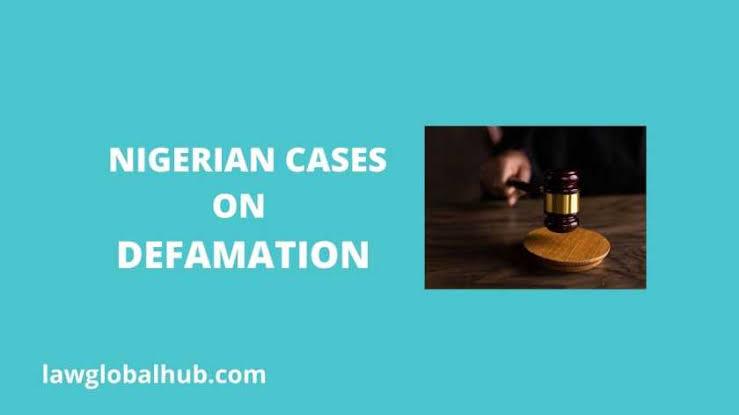Nigerian cases on Defamation
Below are some Nigerian cases with rationes on defamation. Defamation is the lowering of a person in the estimation of right-thinking members of the society.
Nature and Types of Defamation
SALAUDEEN v. OKUNLOYE (2019) LPELR-48469(CA)
Defamation as a tort, whether libel or slander consists of the publication to a third person or persons of any words or matter which tends to lower the person defamed in the estimation of right thinking members of society generally, or to cut him off from the society or to expose him to hatred, contempt, opprobrium or ridicule or to injure his reputation in his office, trade or profession or to injure his financial credit.
The tort of defamation is either libel or slander. Libel is in written form while slander is spoken words published to another person, other than the person defamed. It is the publication of the libelous matter that gives the plaintiff his right of action, but it must also be re-iterated that libel is all about the estimation in which others hold the plaintiff and not what he thinks of himself. See Black’s Law Dictionary, Ninth Edition page 479 to 480, and the cases of C.S.S.& D.F. Ltd V. Schlumberger (Nig.) Ltd (2018) 15 NWLR (pt. 1642) 238, (SC), Onah V. Schlumberger (Nig.) Ltd (2018) 17 NWLR (pt. 1647) 84, (SC), Oboh V. Guardian Newspaper (2018) LPELR-46511 (CA) and Ubochi V. Ekpo & Ors. (2014) LPELR- 23523(CA) and Ekong V. Otop (supra).” – Per BALKISU BELLO ALIYU, JCA
Proof to succeed in an action for defamation
SKYE BANK PLC V CHIEF MOSES BOLANLE AKINPELU (2010) Legalpedia (SC) 29121
To succeed in an action of libel the plaintiff must prove 3 fundamental elements of defamation constructively:
1. that there is the publication of the material complained of by the defendant;
2. That the publication refers to no other person but the plaintiff conclusively;
3. That the publication is defamatory of the plaintiff. – Per OGEBE JSC
ISIKWENU & ANOR v. IROH (2012) LPELR-19796(CA)
“The Plaintiff in an action for defamation must not only prove that Defendant published the defamatory words he must identify himself as person defamed. See OGBOMOR v. THE STATE (1985) 5 SC 242.” Per TUNDE OYEBANJI AWOTOYE, JCA
Who can bring an action for defamation?
Omega Bank Plc v. Govt., Ekiti State (2007) 16 NWLR (Pt. 1061) 445
Any natural or juristic person (except a government entity) may sue for defamation. An action for defamation is a purely personal action, and the proper person to sue as the plaintiff is the person defamed, and the proper person to be sued as defendant is the person who published the defamatory words or caused them to be published.
Whether or not the words are defamatory
S.B. DALUMO VS THE SKETCH PUBLISHING CO. LTD (1972) Legalpedia (SC) 51111
“As the law stands, the test of whether words that do not specifically name a plaintiff refer to him or not is this. Are the words used such as, reasonably in the circumstance, would lead persons who know the plaintiff to believe that he was the person referred to?” FATAYI-WILLIAMS, JSC.
When is defamation actionable per se
CHIEF TONY OKOROJI v. ONYEKA ONWENU (2016)LCN/9036(CA)
“Defamation/libel is actionable per se and once there is credible evidence and the Court is satisfied as in the case of the Appellant, that the defamation was established or proved as required by law, it can find for the Claimant and award damages, as may be appropriate.
There is no need for proof of actual damages in monetary or material terms by the claimant before an award of damages is made by the Court. The damages are presumed by law to have flowed naturally and automatically from the proved defamation/libel of the Claimant.
See Asheik v. M. T. Nig. Ltd (2010) 15 NWLR (1215) 114; Odueole v. West (2010) 10 NWLR (1203) 598: Guardian Newspapers Ltd v. Ajeh (2011) 10 NWLR (1256) 574. Because the assessment of damages for libel is in the realm of general damages that are presumed by law, factors to be considered would be the peculiar facts and circumstances of the defamation as shown in the evidence placed before the Court.” – Per MOHAMMED LAWAL GARBA, JCA
See also:


Leave a Reply